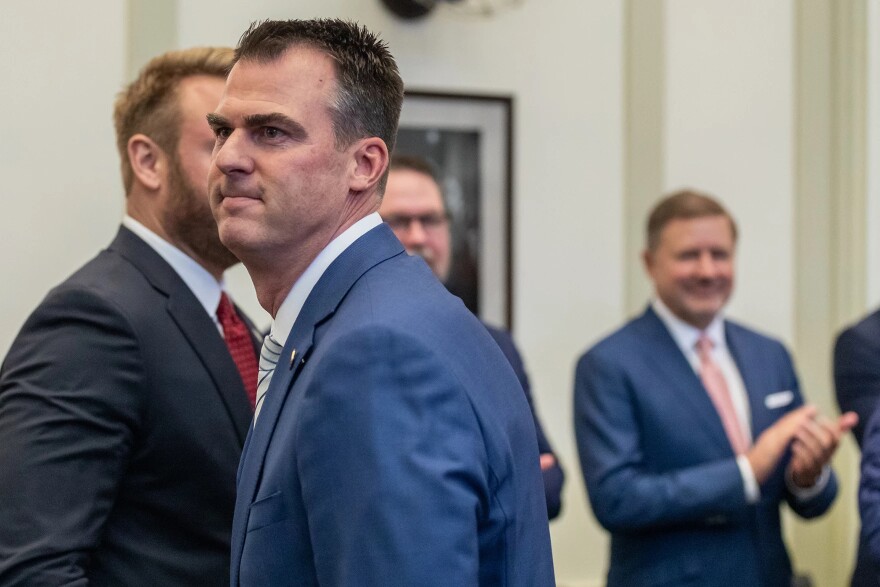Oklahoma Attorney General Gentner Drummond says he’s taking over gaming compact negotiations with tribal nations from Gov. Kevin Stitt.
Drummond says Stitt’s litigation with the tribes has cost Oklahoma taxpayers millions of dollars and has damaged state and tribal relations.
In the last month, legislative leaders have asked Drummond to take over for Stitt in compact negotiations. In a letter to Stitt, he obliges.
"As you should fully understand, this long running and costly litigation is a direct result of your refusal to follow Oklahoma law," Drummond wrote.
The lawsuits stem from Stitt entering into four gaming compacts with tribal nations in 2020 outside what other tribes use. He was sued by the Cherokee, Chickasaw, Choctaw and Citizen Potawatomi Nation over the legality of the move. That is what Drummond says he will be formally taking over.
Oklahoma Senate Pro Tempore Greg Treat and Speaker of the House Charles McCall filed a lawsuit against Stitt in 2020 questioning the Governor’s authority to sign the compacts without the legislature’s consent. The Oklahoma Supreme Court ruled in their favor, saying the compacts the Governor signed weren’t valid.
Stitt has said Drummond doesn’t have the authority to take over the lawsuits or negotiations for compacts between the state and tribal governments. The compacts determine the rules and payments tribal nations make to the state to operate gambling operations in Oklahoma.
According to the letter sent to the Governor, his administration has spent millions of dollars to litigate the compacts and other matters against the tribes.
"To date, three private law firms have racked up nearly $600,000 defending the unlawful compacts in the litigation before the U.S. District Court of the District of Columbia," Drummond wrote in a press release. "Millions more have been spent on other legal battles against tribes during the course of the Governor’s tenure."
When KOSU asked Drummond where the money is coming from for Stitt’s litigation, he said he could only speculate.
"I anticipate that it's coming from the compacting fees that the tribes pay for purposes of enforcing the compact," he said. "That's my supposition."
KOSU has filed records requests about the funding for the litigation through the Oklahoma Office of Management and Enterprise Services and the former AG’s office, and to date hasn’t received a response.
Stitt's office panned Drummond’s actions.
“General Drummond, in an unprecedented move, is turning his back on four tribes who have been sued by Oklahoma’s wealthiest tribes,” Stitt spokeswoman Abegail Cave wrote in a statement. “Drummond continues to work with these wealthy tribes as they use Oklahoma political officials to further their agenda. Governor Stitt is actively fighting for eastern Oklahoma as these tribes continue their efforts to turn Tulsa and much of the rest of eastern Oklahoma into a reservation.”
Last fall, the Governor hired new outside counsel to defend against the lawsuits. Stitt has retained Washington D.C. based law firms Sullivan and Cromwell, and Troutman, Pepper, Hamilton and Sanders.
Oklahoma House Speaker Charles McCall said the legislature may revoke Stitt's ability to negotiate compacts based on his hiring of outside counsel-something he and the pro tem had no knowledge of.
In late November of last year, a United States District Court for the District of Columbia upheld the decision of the Oklahoma Supreme Court, saying the compacts aren’t legal and the U.S. Department of the Interior had the obligation to determine the validity of the contested agreements before allowing them to go into effect.
The judge went even further in his November 23, 2022 ruling, saying the U.S. Department of the Interior should have investigated the compacts further because they had received a letter on May 5, 2020, from then-Attorney General Mike Hunter saying the agreements between the four tribes and Stitt violated the Indian Gaming and Regulatory Act. He also dismissed two of the tribal nations from the lawsuit — Kialegee Tribal Town and the United Keetoowah Band.
In the bigger picture, Drummond said his action is necessary to preserve state-tribal nation relations.
“Oklahoma’s relationship with our tribal partners has suffered greatly as a result of your divisive rhetoric and refusal to follow the law,” Drummond wrote. “The citizens you were elected to serve are the ones who suffer from this irresponsible approach. Instead of working in partnership with tribal leaders to enact compacts that benefit all four million Oklahomans, you insist on costly legal battles that only benefit the elite law firms you hire. Millions of dollars of state resources have been squandered on these futile efforts.”



